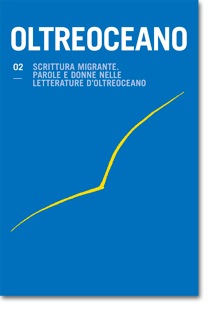Creare una memoria collettiva: le donne e i documentari italoamericani
Keywords:
documentari, storia, memoria collettiva, identità etnicaAbstract
Sia che si pongano come intermediarie tra generazioni, o negli interstizi tra storia e memoria, creatività e documento, le autrici dei documentari sembrano ritagliarsi un ruolo particolare come creatrici di una memoria collettiva e consolidatrici di un’identità etnica come quella italoamericana, forte ed in continua evoluzione.
Creating Collective Memory: Women and Italian-american Documentaries
Whether they situate themselves as intermediaries between generations or in the interstices between history and memory and between creativity and documenting, the authors of documentaries play a key role in creating collective memory and in consolidating the ever-evolving Italian-American ethnic identity.
Downloads
References
Bruno, G. (1993): Streetwalking on a Ruined Map: Cultural Theory and the City Films of Elvira Notari. Princeton: Princeton UP.
Del Giudice, L. (1994); Beth Harrington, Ave Maria: The Story of a Fisherman’s Feast. Katherine Gulla: My Town (Mio Paese). Western Folklore, 53, 3, pp. 257-262.
Lipson, K. (2008,13 genuary): Refusing to Let the Mob Hijack What It Means to Be Italian. New York Times: In the Region.
Rich, B. R. (2006): In Focus: Documentary. Cinema Journal, XLVI, 1, pp. 108-140.
Tamburri, A.J. (2001): Italian American Short Film and Music Videos. A Semiotic Reading. Digital I-Book, West-Lafayette: Purdue University Press.
Taubin, A. (2004, Summer): Documenting Women. Female Directors Rule the Hot Non-Fiction Film Market– except on the Big Screen. Ms Magazine. Recuperato da http://www.msmagazine.com/summer2004/womenonfilm.asp
Downloads
Published
How to Cite
Issue
Section
License

This work is licensed under a Creative Commons Attribution-NonCommercial-ShareAlike 4.0 International License.
The authors undertake to comply with the following conditions, which are considered accepted at the time of submission of their contributions.
The sending of a text implies that it is unpublished and not submitted to be published elsewhere.
1. If accepted, the author shall confer on the publisher the right to publish and distribute it both in paper form and in the online electronic edition. The published articles will be downloadable and made available in open access.
2. Provided that it correctly indicates that the first publication took place in the journal Oltreoceano. Rivista sulle migrazioni the author has the right to: a) reproduce the article in separate extracts or collected in a volume; b) publish the article on their personal website or teaching site provided that these sites are of a non-commercial nature; c) deposit the article in online archives of a non-commercial nature, linked to the institution they belong to or as part of projects for the non-commercial dissemination and open access of scientific works.
The use of contributions by third parties, for commercial or otherwise unauthorized purposes, is not allowed. The publisher declines all responsibility for the unauthorized use of the material published in the journal.












